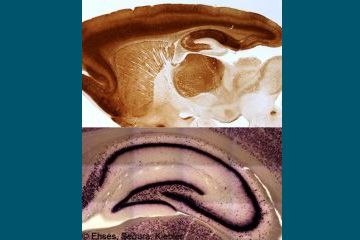
At the cellular level, learning and memory rely on the physical modification of synapses, which are ultimately encoded by transported mRNAs and protein synthesis “onsite”. In previous studies, Michael Kiebler and his team have shown that the RNA-binding protein Staufen2 is essential in conveying mRNAs to their destinations. Now, a new study carried out by the Kiebler group and colleagues shows that reduced levels of Staufen2 are associated with a specific impairment of memory. Using a genetic model in which Staufen2 can be conditionally and selectively suppressed in nerve cells in the rat forebrain, they observed that Staufen2 depletion affected nerve-cell morphology, synaptic function and impaired spatial, temporal and associative memory. The findings appear in the journal Genome Biology.
Stefan M. Berger, Iván Fernández-Lamo, Kai Schönig, Sandra M. Fernández Moya, Janina Ehses, Rico Schieweck, Stefano Clementi, Thomas Enkel, Sascha Grothe, Oliver von Bohlen und Halbach, Inmaculada Segura, José María Delgado-García, Agnès Gruart, Michael A. Kiebler and Dusan Bartsch.
Forebrain-specific, conditional silencing of Staufen2 alters synaptic plasticity, learning and memory in rats.
Genome Biology 2017 Nov 17;18(1):222. doi: 10.1186/s13059-017-1350-8.
Forschergruppe 2333
Prof. Dr. Dierk Niessing (Sprecher)
Ulm University - Institute of Pharmaceutical Biotechnology
James Franck Ring N27
89081 Ulm
Phone: +49 89 3187 2176
EMail: info@for2333.de